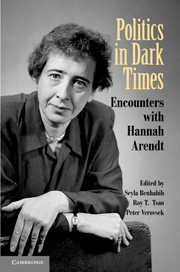Book contents
- Frontmatter
- Contents
- Notes on Contributors
- Introduction
- Part I Freedom, Equality, and Responsibility
- Part II Sovereignty, the Nation-State, and the Rule of Law
- Part III Politics in Dark Times
- 10 In Search of a Miracle: Hannah Arendt and the Atomic Bomb
- 11 Hannah Arendt between Europe and America: Optimism in Dark Times
- 12 Keeping the Republic: Reading Arendt's On Revolution after the Fall of the Berlin Wall
- Part IV Judging Evil
- Index
10 - In Search of a Miracle: Hannah Arendt and the Atomic Bomb
Published online by Cambridge University Press: 05 June 2012
- Frontmatter
- Contents
- Notes on Contributors
- Introduction
- Part I Freedom, Equality, and Responsibility
- Part II Sovereignty, the Nation-State, and the Rule of Law
- Part III Politics in Dark Times
- 10 In Search of a Miracle: Hannah Arendt and the Atomic Bomb
- 11 Hannah Arendt between Europe and America: Optimism in Dark Times
- 12 Keeping the Republic: Reading Arendt's On Revolution after the Fall of the Berlin Wall
- Part IV Judging Evil
- Index
Summary
In the work Hannah Arendt published in her lifetime, there is a conspicuous gap. She reflected deeply and powerfully on the nature of totalitarianism, imperialism, nationalism, antisemitism, and almost every other horror and vexation of the twentieth century that might be mentioned, yet she devoted no sustained attention to nuclear arms, which of course were born into the world in July of 1945, a full six years before she published her first thoroughly political book, The Origins of Totalitarianism. The omission had a particular fascination for me. Beginning in the mid-1970s, I began to devote my attention to the nuclear dilemma. Notwithstanding her avoidance of the subject, I found her work more fruitful than anyone else's for thinking about it, and especially for riddling out the meaning of the possible self-extinction of human beings that nuclear arsenals had made possible. For example, in her thinking about the great crimes of the twentieth century, she gave primacy to genocide. As she was one of the first to understand, that crime has a special significance not only because of the shocking numbers of people killed but also because each act of genocide is an attack on the “plurality” of the earth's peoples. That is, it not only destroys living persons but also shuts down the unique culture and public world of a whole people and its traditions. Genocide is, to speak in contemporary terms, a kind of ecological crime within the human sphere: a crime against the diversity of human cultures. It is also a crime against the human future, inasmuch as its essence is cancellation of the regenerating power of a people, which thereafter disappears from the continuation of the human story. (If some of the people's murderers could have their way, it would disappear from memory as well.) Clearly, a nuclear holocaust would be an event of this kind, though raised to a higher order. It would be the highest crime of that type, destroying all peoples and, thus, the human future per se.
- Type
- Chapter
- Information
- Politics in Dark TimesEncounters with Hannah Arendt, pp. 247 - 258Publisher: Cambridge University PressPrint publication year: 2010
- 4
- Cited by

